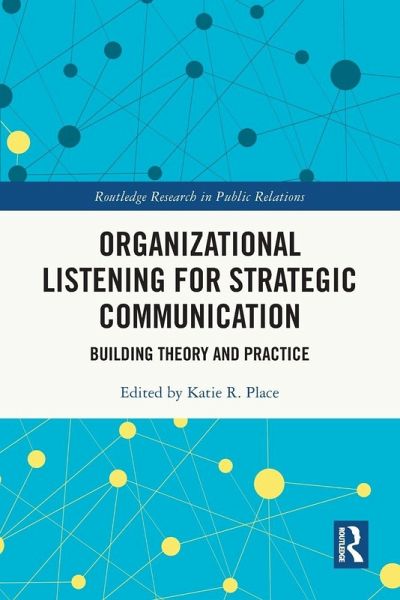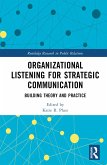Organizational Listening for Strategic Communication
Building Theory and Practice
Herausgeber: Place, Katie R.
Organizational Listening for Strategic Communication
Building Theory and Practice
Herausgeber: Place, Katie R.
- Broschiertes Buch
- Merkliste
- Auf die Merkliste
- Bewerten Bewerten
- Teilen
- Produkt teilen
- Produkterinnerung
- Produkterinnerung
Embracing listening as a useful tool for strengthening organization-publics and organization-employee relationships, this book offers theoretical and practical insights for listening across myriad strategic communication contexts.
Andere Kunden interessierten sich auch für
![Organizational Listening for Strategic Communication Organizational Listening for Strategic Communication]() Organizational Listening for Strategic Communication123,99 €
Organizational Listening for Strategic Communication123,99 €![The Routledge Handbook of Corporate Social Responsibility Communication The Routledge Handbook of Corporate Social Responsibility Communication]() The Routledge Handbook of Corporate Social Responsibility Communication181,99 €
The Routledge Handbook of Corporate Social Responsibility Communication181,99 €![Social Media and Crisis Communication Social Media and Crisis Communication]() Social Media and Crisis Communication34,99 €
Social Media and Crisis Communication34,99 €![Social Media and Crisis Communication Social Media and Crisis Communication]() Social Media and Crisis Communication123,99 €
Social Media and Crisis Communication123,99 €![Communication and Organizational Changemaking for Diversity, Equity, and Inclusion Communication and Organizational Changemaking for Diversity, Equity, and Inclusion]() Communication and Organizational Changemaking for Diversity, Equity, and Inclusion67,99 €
Communication and Organizational Changemaking for Diversity, Equity, and Inclusion67,99 €![The Routledge Handbook of Nonprofit Communication The Routledge Handbook of Nonprofit Communication]() The Routledge Handbook of Nonprofit Communication181,99 €
The Routledge Handbook of Nonprofit Communication181,99 €![DEI and Intersectional Social Identities at Work DEI and Intersectional Social Identities at Work]() Donnalyn PompperDEI and Intersectional Social Identities at Work37,99 €
Donnalyn PompperDEI and Intersectional Social Identities at Work37,99 €-
-
-
Embracing listening as a useful tool for strengthening organization-publics and organization-employee relationships, this book offers theoretical and practical insights for listening across myriad strategic communication contexts.
Hinweis: Dieser Artikel kann nur an eine deutsche Lieferadresse ausgeliefert werden.
Hinweis: Dieser Artikel kann nur an eine deutsche Lieferadresse ausgeliefert werden.
Produktdetails
- Produktdetails
- Routledge Research in Public Relations
- Verlag: Taylor & Francis Ltd
- Seitenzahl: 302
- Erscheinungstermin: 28. November 2024
- Englisch
- Abmessung: 152mm x 229mm x 22mm
- Gewicht: 488g
- ISBN-13: 9781032227160
- ISBN-10: 1032227168
- Artikelnr.: 71913742
- Herstellerkennzeichnung
- Produktsicherheitsverantwortliche/r
- Europaallee 1
- 36244 Bad Hersfeld
- gpsr@libri.de
- Routledge Research in Public Relations
- Verlag: Taylor & Francis Ltd
- Seitenzahl: 302
- Erscheinungstermin: 28. November 2024
- Englisch
- Abmessung: 152mm x 229mm x 22mm
- Gewicht: 488g
- ISBN-13: 9781032227160
- ISBN-10: 1032227168
- Artikelnr.: 71913742
- Herstellerkennzeichnung
- Produktsicherheitsverantwortliche/r
- Europaallee 1
- 36244 Bad Hersfeld
- gpsr@libri.de
Katie R. Place is Professor of Strategic Communication in the School of Communication at Quinnipiac University, USA. Her research examines power, ethics, and listening in public relations. She has authored more than 60 conference papers or publications in such peer-reviewed journals as Journal of Public Relations Research, Public Relations Review, and Journal of Media Ethics.
Unit 1: Organizational Listening Competencies and Technologies
1.Stakeholders' Conceptualizations of Organizational Listening 2.
Incorporating competent interpersonal listening practices in social media
3. Developing Organizational Employee Communication Competency Diagnostics
: Breaking Employee Silence via Organizational Climate of Listening for
Dialogic Employee Communication 4: The Power of AI-Enabled Chatbots as an
Organizational Social Listening Tool 5. Evaluating Organizational
Listening: Models and Methods for Measuring the Value of Listening for
Identifying Opportunities, Risks, and Crises Unit 2: Organizational
Listening for Ethics and Justice 6. The State of Ethical Listening to
External Stakeholders in U.S. Organizations 7. Why Are Organizations
Criticized for Not Listening? Findings from Practitioners and Publics 8.
Improving Organizational Listening to Build Trust with Black Residents and
Disrupt Racism in Local Government 9. Organizational Social Listening &
Corporate Climate Advocacy: Amazon & Amazon Employees for Climate Justice
Unit 3: Organizational Listening for Diversity, Equity, and Inclusion 10.
Organizational Listening for Diversity, Equity & Inclusion 11. Listening in
polarized times: Centering presence in Arendt's actualized plurality for
organizational listening 12. Listening to historically marginalized
publics: A conceptualization of perceived organizational listening in LGBTQ
advocacy 13. Organizational Listening and Empowered women in the workplace:
A cross-cultural comparison between the U.S. and South Korea Unit 4:
Cultural and Global Considerations for Organizational Listening 14. The
Local and the Global in Organizational Listening Amidst an Evolving Media
Landscape 15. Listening across borders: Global considerations for listening
and public diplomacy Conclusion. The Future of Organizational Listening
Research and Practice
1.Stakeholders' Conceptualizations of Organizational Listening 2.
Incorporating competent interpersonal listening practices in social media
3. Developing Organizational Employee Communication Competency Diagnostics
: Breaking Employee Silence via Organizational Climate of Listening for
Dialogic Employee Communication 4: The Power of AI-Enabled Chatbots as an
Organizational Social Listening Tool 5. Evaluating Organizational
Listening: Models and Methods for Measuring the Value of Listening for
Identifying Opportunities, Risks, and Crises Unit 2: Organizational
Listening for Ethics and Justice 6. The State of Ethical Listening to
External Stakeholders in U.S. Organizations 7. Why Are Organizations
Criticized for Not Listening? Findings from Practitioners and Publics 8.
Improving Organizational Listening to Build Trust with Black Residents and
Disrupt Racism in Local Government 9. Organizational Social Listening &
Corporate Climate Advocacy: Amazon & Amazon Employees for Climate Justice
Unit 3: Organizational Listening for Diversity, Equity, and Inclusion 10.
Organizational Listening for Diversity, Equity & Inclusion 11. Listening in
polarized times: Centering presence in Arendt's actualized plurality for
organizational listening 12. Listening to historically marginalized
publics: A conceptualization of perceived organizational listening in LGBTQ
advocacy 13. Organizational Listening and Empowered women in the workplace:
A cross-cultural comparison between the U.S. and South Korea Unit 4:
Cultural and Global Considerations for Organizational Listening 14. The
Local and the Global in Organizational Listening Amidst an Evolving Media
Landscape 15. Listening across borders: Global considerations for listening
and public diplomacy Conclusion. The Future of Organizational Listening
Research and Practice
Unit 1: Organizational Listening Competencies and Technologies
1.Stakeholders' Conceptualizations of Organizational Listening 2.
Incorporating competent interpersonal listening practices in social media
3. Developing Organizational Employee Communication Competency Diagnostics
: Breaking Employee Silence via Organizational Climate of Listening for
Dialogic Employee Communication 4: The Power of AI-Enabled Chatbots as an
Organizational Social Listening Tool 5. Evaluating Organizational
Listening: Models and Methods for Measuring the Value of Listening for
Identifying Opportunities, Risks, and Crises Unit 2: Organizational
Listening for Ethics and Justice 6. The State of Ethical Listening to
External Stakeholders in U.S. Organizations 7. Why Are Organizations
Criticized for Not Listening? Findings from Practitioners and Publics 8.
Improving Organizational Listening to Build Trust with Black Residents and
Disrupt Racism in Local Government 9. Organizational Social Listening &
Corporate Climate Advocacy: Amazon & Amazon Employees for Climate Justice
Unit 3: Organizational Listening for Diversity, Equity, and Inclusion 10.
Organizational Listening for Diversity, Equity & Inclusion 11. Listening in
polarized times: Centering presence in Arendt's actualized plurality for
organizational listening 12. Listening to historically marginalized
publics: A conceptualization of perceived organizational listening in LGBTQ
advocacy 13. Organizational Listening and Empowered women in the workplace:
A cross-cultural comparison between the U.S. and South Korea Unit 4:
Cultural and Global Considerations for Organizational Listening 14. The
Local and the Global in Organizational Listening Amidst an Evolving Media
Landscape 15. Listening across borders: Global considerations for listening
and public diplomacy Conclusion. The Future of Organizational Listening
Research and Practice
1.Stakeholders' Conceptualizations of Organizational Listening 2.
Incorporating competent interpersonal listening practices in social media
3. Developing Organizational Employee Communication Competency Diagnostics
: Breaking Employee Silence via Organizational Climate of Listening for
Dialogic Employee Communication 4: The Power of AI-Enabled Chatbots as an
Organizational Social Listening Tool 5. Evaluating Organizational
Listening: Models and Methods for Measuring the Value of Listening for
Identifying Opportunities, Risks, and Crises Unit 2: Organizational
Listening for Ethics and Justice 6. The State of Ethical Listening to
External Stakeholders in U.S. Organizations 7. Why Are Organizations
Criticized for Not Listening? Findings from Practitioners and Publics 8.
Improving Organizational Listening to Build Trust with Black Residents and
Disrupt Racism in Local Government 9. Organizational Social Listening &
Corporate Climate Advocacy: Amazon & Amazon Employees for Climate Justice
Unit 3: Organizational Listening for Diversity, Equity, and Inclusion 10.
Organizational Listening for Diversity, Equity & Inclusion 11. Listening in
polarized times: Centering presence in Arendt's actualized plurality for
organizational listening 12. Listening to historically marginalized
publics: A conceptualization of perceived organizational listening in LGBTQ
advocacy 13. Organizational Listening and Empowered women in the workplace:
A cross-cultural comparison between the U.S. and South Korea Unit 4:
Cultural and Global Considerations for Organizational Listening 14. The
Local and the Global in Organizational Listening Amidst an Evolving Media
Landscape 15. Listening across borders: Global considerations for listening
and public diplomacy Conclusion. The Future of Organizational Listening
Research and Practice








